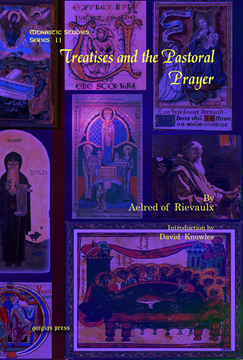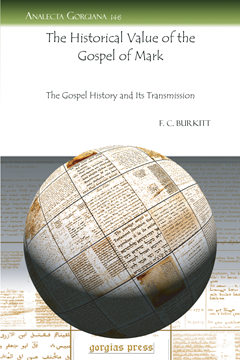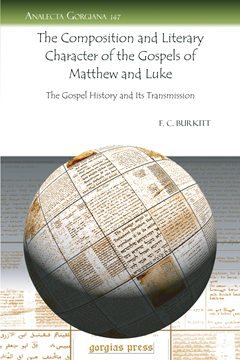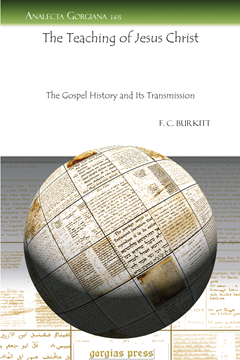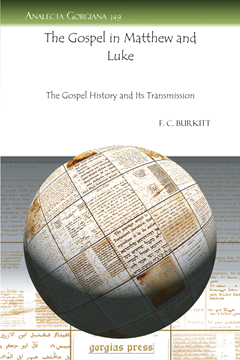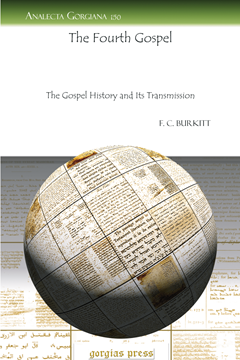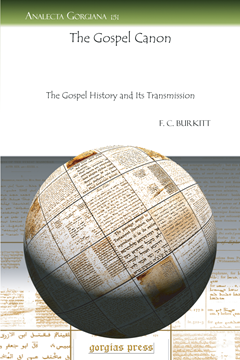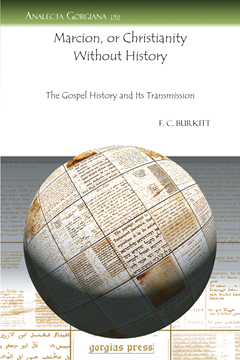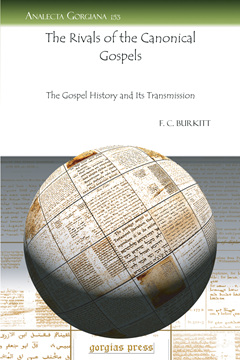Treatises and the Pastoral Prayer
By Aelred of Rievaulx; Introduction by David Knowles
Series: Monastic Studies Series 11
ISBN: 978-1-60724-189-8
Meditation on Christ's humanity and a letter of instruction on a disciplined spiritual life for his sister, epitomize Aelred's gentle spirituality. His pastoral prayer reflects a man conscious that he is accountable to God for the souls of others.
$152.00 (USD) $91.20 (USD)
The Literary Originality of the Gospel of Mark
The Gospel History and Its Transmission
Series: Analecta Gorgiana 145
ISBN: 978-1-60724-114-0
Originally delivered as one of the Jowett Lectures for 1906, the contents of this booklet emerged during the first quest for the historical Jesus. Somewhat surprisingly, Burkitt discovered that historical criticism increased the historical credibility of the Synoptic Gospels in his estimation. This first lecture in the series addresses the literary originality of the Gospel of Mark. Here Burkitt surveys the priority of Mark, the shared Synoptic material, and the literarily unique sections of Mark.
$36.00 (USD) $21.60 (USD)
The Historical Value of the Gospel of Mark
The Gospel History and Its Transmission
Series: Analecta Gorgiana 146
ISBN: 978-1-60724-115-7
Originally delivered as one of the Jowett Lectures for 1906, the contents of this booklet emerged during the first quest for the historical Jesus. Somewhat surprisingly, Burkitt discovered that historical criticism increased the historical credibility of the Synoptic Gospels in his estimation. This second lecture in the series addresses the historical value of the Gospel of Mark. Here Burkitt considers the historical questions of how accurately Mark may portray his limited life of Jesus.
$39.00 (USD) $23.40 (USD)
The Composition and Literary Character of the Gospels of Matthew and Luke
The Gospel History and Its Transmission
Series: Analecta Gorgiana 147
ISBN: 978-1-60724-116-4
Originally delivered as one of the Jowett Lectures for 1906, the contents of this booklet emerged during the first quest for the historical Jesus. Somewhat surprisingly, Burkitt discovered that historical criticism increased the historical credibility of the Synoptic Gospels in his estimation. This third lecture in the series addresses the composition and literary characteristics of the Gospels of Matthew and Luke.
$38.00 (USD) $22.80 (USD)
The Teaching of Jesus Christ
The Gospel History and Its Transmission
Series: Analecta Gorgiana 148
ISBN: 978-1-60724-117-1
Originally delivered as one of the Jowett Lectures for 1906, the contents of this booklet emerged during the first quest for the historical Jesus. Somewhat surprisingly, Burkitt discovered that historical criticism increased the historical credibility of the Synoptic Gospels in his estimation. This fourth lecture in the series begins by noting that in early Christianity it was Jesus that was preached and not Jesus’ sayings. Burkitt thus suggests some criteria for finding Jesus’ original words and then applies them in order to reconstruct the teachings of Jesus.
$41.00 (USD) $24.60 (USD)
The Gospel in Matthew and Luke
The Gospel History and Its Transmission
Series: Analecta Gorgiana 149
ISBN: 978-1-60724-118-8
Originally delivered as one of the Jowett Lectures for 1906, the contents of this booklet emerged during the first quest for the historical Jesus. Somewhat surprisingly, Burkitt discovered that historical criticism increased the historical credibility of the Synoptic Gospels in his estimation. This fifth lecture in the series examines the concept of gospel in Matthew and Luke. Burkitt notes the special emphases and concerns of these two Gospel writers, calling attention to how they differ from each other and also from Mark.
$38.00 (USD) $22.80 (USD)
The Fourth Gospel
The Gospel History and Its Transmission
Series: Analecta Gorgiana 150
ISBN: 978-1-60724-119-5
Originally delivered as one of the Jowett Lectures for 1906, the contents of this booklet emerged during the first quest for the historical Jesus. Somewhat surprisingly, Burkitt discovered that historical criticism increased the historical credibility of the Synoptic Gospels in his estimation. This sixth lecture in the series turns to the Gospel of John. Burkitt addresses the enduring questions of authorship and historicity, comparing the Gospel of John to the Synoptics, Philo, the Gnostics, and the Stoics.
$41.00 (USD) $24.60 (USD)
The Gospel Canon
The Gospel History and Its Transmission
Series: Analecta Gorgiana 151
ISBN: 978-1-60724-120-1
Originally delivered as one of the Jowett Lectures for 1906, the contents of this booklet emerged during the first quest for the historical Jesus. Somewhat surprisingly, Burkitt discovered that historical criticism increased the historical credibility of the Synoptic Gospels in his estimation. This seventh lecture in the series traces the origin of the authoritative four-fold Gospels to about 150 of the Common Era when they are amply attested together. Positing a three-stage evolution to the canonical Gospels, Burkitt notes that other Gospels did not measure up to the same standard.
$38.00 (USD) $22.80 (USD)
Marcion, or Christianity Without History
The Gospel History and Its Transmission
Series: Analecta Gorgiana 152
ISBN: 978-1-60724-121-8
Originally delivered as one of the Jowett Lectures for 1906, the contents of this booklet emerged during the first quest for the historical Jesus. Somewhat surprisingly, Burkitt discovered that historical criticism increased the historical credibility of the Synoptic Gospels in his estimation. This eighth lecture in the series addresses Marcion. Burkitt focuses on how this early Christian thinker remained ahead of his time while also falling out of the mainstream of what was an emerging Christianity.
$39.00 (USD) $23.40 (USD)
The Rivals of the Canonical Gospels
The Gospel History and Its Transmission
Series: Analecta Gorgiana 153
ISBN: 978-1-60724-122-5
Originally delivered as one of the Jowett Lectures for 1906, the contents of this booklet emerged during the first quest for the historical Jesus. Somewhat surprisingly, Burkitt discovered that historical criticism increased the historical credibility of the Synoptic Gospels in his estimation. This ninth lecture in the series concerns itself with the non-canonical, or apocryphal gospels. Written before the discovery of the Nag-Hammadi library, this study considers the Testamentum Domini, Pistis Sophia, the Gospel and Apocalypse of St. Peter, the Protevangelium of James, the Infancy Gospel of Thomas, the Gospel According to the Hebrews, and the Oxyrhynchus Logia..
$37.00 (USD) $22.20 (USD)
